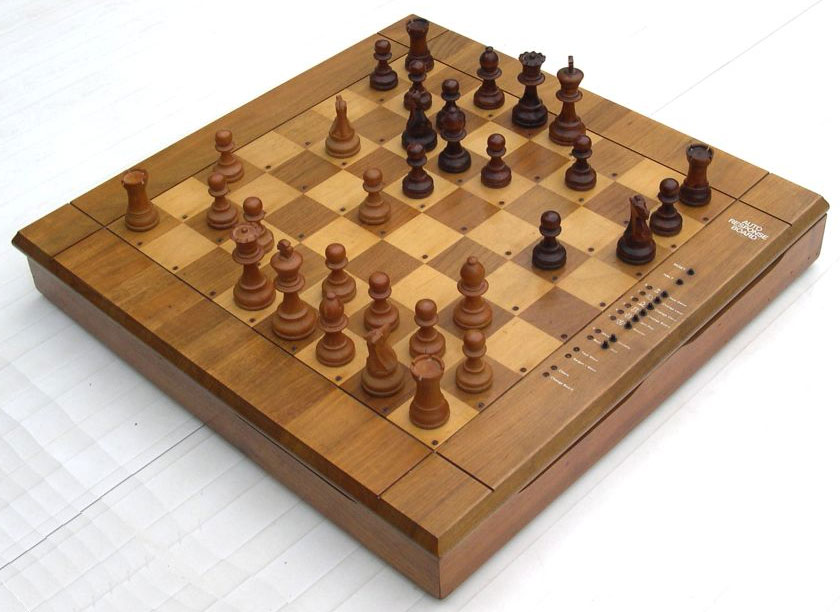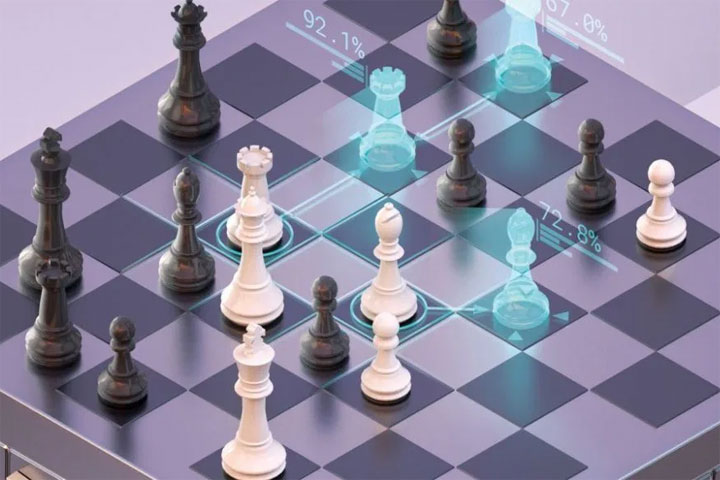Alpha-even-more-Zero...
In 1980 the first chess computer with an auto response board, the Chafitz ARB Sargon 2.5, was released. It was programmed by Dan and Kathe Spracklen and had a sensory board and magnet pieces. The magnets embedded in the pieces were all the same kind, so that the board could only detect whether there was a piece on the square or not. It would signal its moves with LEDs located on the corner of each square.

Chafitz ARB Sargon 2.5 | Photo: My Chess Computers
Some years after the release of this computer I visited the Spracklens in their home in San Diego, and one evening had an interesting discussion, especially with Kathy. What would happen, we wondered, if we set up a Sargon 2.5 in a jungle village where nobody knew chess. If we left the people alone with the permanently switched-on board and pieces, would they be able to figure out the game? If they lifted a piece, the LED on that square would light up; if they put it on another square that LED would light up briefly. If the move was legal, there would be a reassuring beep; the square of a piece of the opposite colour would light up, and if they picked up that piece another LED would light up. If the original move wasn’t legal, the board would make an unpleasant sound.
Our question was: could they figure out, by trial and error, how chess was played? Kathy and I discussed it at length, over the Sargon board, and in the end came to the conclusion that it was impossible — they could never figure out the game without human instructions. Chess is far too complex.
Now, three decades later, I have to modify our conclusion somewhat: maybe humans indeed cannot learn chess by pure trial and error, but computers can...
DeepMind’s MuZero teaches itself
You remember how AlphaGo and AlphaZero were created, by Google's DeepMind division. The programs Leela and Fat Fritz were generated using the same principle: tell an AI program the rules of the game, how the pieces move, and then let it play millions of games against itself. The program draws its own conclusions about the game and starts to play master-level chess. In fact, it can be argued that these programs are the strongest entities to have ever played chess — human or computer.
Now DeepMind has come up with a fairly atrocious (but scientifically fascinating) idea: instead of telling the AI software the rules of the game, just let it play, using trial and error. Let it teach itself the rules of the game, and in the process learn to play it professionally. DeepMind combined a tree-based search (where a tree is a data structure used for locating information from within a set) with a learning model. They called the project MuZero. The program must predict the quantities most relevant to game planning — not just for chess, but for 57 different Atari games. The result: MuZero, we are told, matches the performance of AlphaZero in Go, chess, and shogi.
And this is how MuZero works (description from VenturBeat):
Fundamentally MuZero receives observations — images of a Go board or Atari screen — and transforms them into a hidden state. This hidden state is updated iteratively by a process that receives the previous state and a hypothetical next action, and at every step the model predicts the policy (e.g., the move to play), value function (e.g., the predicted winner), and immediate reward (e.g., the points scored by playing a move)."

Evaluation of MuZero throughout training in chess, shogi, Go, and Atari — the y-axis shows Elo rating | Image: DeepMind
As the DeepMind researchers explain, one form of reinforcement learning — the technique in which rewards drive an AI agent toward goals — involves models. This form models a given environment as an intermediate step, using a state transition model that predicts the next step and a reward model that anticipates the reward. If you are interested in this subject you can read the article on VenturBeat, or visit the Deep Mind site. There you can read this paper on the general reinforcement learning algorithm that masters chess, shogi and Go through self-play. Here's an abstract:
The game of chess is the longest-studied domain in the history of artificial intelligence. The strongest programs are based on a combination of sophisticated search techniques, domain-specific adaptations, and handcrafted evaluation functions that have been refined by human experts over several decades. By contrast, the AlphaGo Zero program recently achieved superhuman performance in the game of Go by reinforcement learning from self-play. In this paper, we generalize this approach into a single AlphaZero algorithm that can achieve superhuman performance in many challenging games. Starting from random play and given no domain knowledge except the game rules, AlphaZero convincingly defeated a world champion program in the games of chess and shogi (Japanese chess), as well as Go.
That refers to the original AlphaGo development, which has now been extended to MuZero. Turns out it is possible not just to become highly proficient at a game by playing it a million times against yourself, but in fact it is possible to work out the rules of the game by trial and error.
I have just now learned about this development and need to think about the consequences — discuss it with experts. My first somewhat flippant reaction to a member of the Deep Mind team: "What next? Show it a single chess piece and it figures out the whole game?"

























